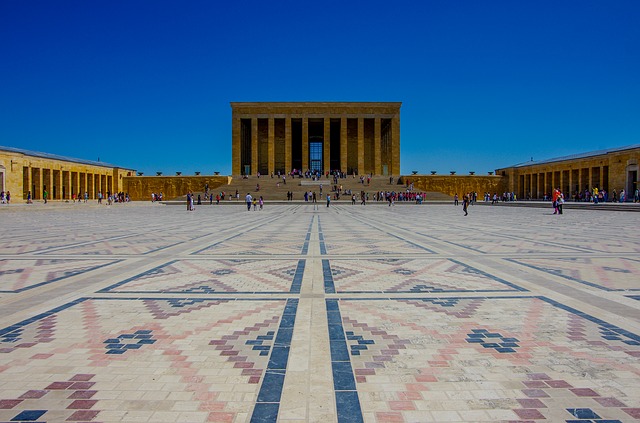ONE common mistake made by those not familiar with Turkey is to assume that Istanbul is the capital of the country. This is surely forgivable, considering that Istanbul is the former imperial capital and a former jewel in the Ottoman Empire – it’s also the largest city in Europe.

But the truth is that the city of Ankara with its population of over 5 million is Turkey’s capital, and it’s cherished amongst Turks as the more modern and industrious face of their country. Ankara has its own museums, its own wonderful architecture and its history embodies the great entanglements of history which characterise Turkey, which by virtue of its location has always existed on the moving tectonic plates of past empires.
The city hosts the largest exhibition hall in Turkey at the CerModern, a huge public art space and cultural centre opened in April 2010. Housed in a splendidly renovated former railway workshop, it serves as the centre for learning about Western art, international literature and also hosts a large yoga space. It’s the venue for concerts by internationally famous jazz musicians and open-air film screenings.
If that alone isn’t enough to convince you of Ankara’s cultural credentials, the city also hosts some of the largest cultural festivals in Europe. Springtime sees Ankara host an international film festival and an international music festival, so we’ve put together some short guides below to give you an overview of the cultural impact Ankara has built up all by itself.
Since the inaugural film festival in 1988, held under the title of ‘Ankara Film Fair’, the whole focus of the event has been to nurture and encourage the best of the talent available in Turkish cinema, ensuring the country’s filmmakers have the platform to make strong starts in their careers.
One of the most famous graduates of the Ankara festival making films today is Nuri Bilge Ceylan, who claimed the pinnacle prize of filmmaking, the Grand Prix of Cannes, in 2003 for his film Uzak (Distant).
By the time he had won the Cannes award, he had already been awarded the Best Film, Best Editing, Best Director and Best Cinematography prizes at the Ankara Film Festival in 2002. Tragically, the 28-year-old star of Uzak Mehmet Emin Toprak died whilst returning home from the film festival.
Here’s the trailer for Uzak, a film which is considered to be amongst the very best Turkish film culture has ever produced, and which has received a staggering 31 awards in total:
He was also awarded Best Film in 2000 for Mayis Sikintisi (Clouds of May), and here’s the trailer below:
Zeki Demirkubuz, another famous Turkish director whose career was launched by the International Film Festival, won his first award at the Ankara event in 1994 and was awarded the Best Director award most recently in 2007 for his film Kader. He most recently won plaudits for his film Yeralti, an adaptation of Fyodor Dostoevsky’s Notes from the Underground:
Finally, Reha Erdem is the Turkish director on every foreign film fan’s lips, having won the Best Director award at the Ankara festival for 2017 for his film Koca Dunya (Big, Big World) which serves up a roughed-up Bonnie and Clyde narrative about two orphans. It was also nominated for the Best Film award at the Venice Horizons Film Festival:
Every Spring, the city hosts an international music festival which is now in its 34th year. The performers at the festival are drawn from jazz and classical music backgrounds, but produce work which has a more mainstream and modern angle. Below is a taster of what Nicholas Payton, who was identified as a virtuoso before even leaving high school and who was part of the line-up at the Spring 2017 event, produces for his audiences:
Another artist who blends tradition with a contemporary interpretation of the best of their field is Rafael Armago – he’s famous worldwide for having made successful modern interpretations of flamenco available to new audiences. One memorable review of his work by the New York Times describes his work as being, “in a class by itself,” and describes how Armago is greeted on stage by flamenco fans in the same way rock stars are greeted onto the stage:
It’s said that Ankara life is most influenced by two groups amongst its population – by students who study here, 12,000 of them at Bilkent University which is ranked amongst the world’s best, and by the diplomats living in the city’s embassies who provide political intrigue. Classes at Bilkent are taught in English so that the university is open to a huge number of ambitious prospective students.
It’s clear that any student thinking of studying in Europe should consider studying in Ankara, the true capital of Turkey with an arts culture all of its own amongst a uniquely modern take on Anatolian culture and a welcoming place for international students.
This editorial was sponsored by Bilkent University, to find out more about their courses take a look at their profile.
Employability Rankings compare the employability outcomes of higher education institutions around the world. This year, Bilkent University has again been named as Turkey’s highest-ranked university the latest Quacquarelli Symonds Graduate Employability Rankings for 2018. Bilkent, the premier institution of higher education in Turkey, provides a rich and diverse environment for learning and intellectual growth. Click here to learn more about how to become one of the 40,000 alumni of Bilkent University.